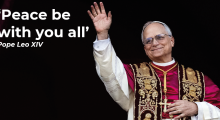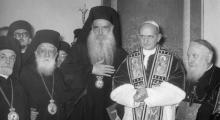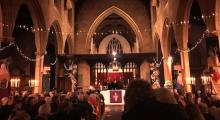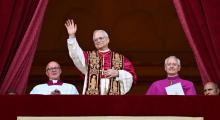Issued by the Catholic Center for Studies and Media - Jordan. Editor-in-chief Fr. Rif'at Bader - موقع أبونا abouna.org
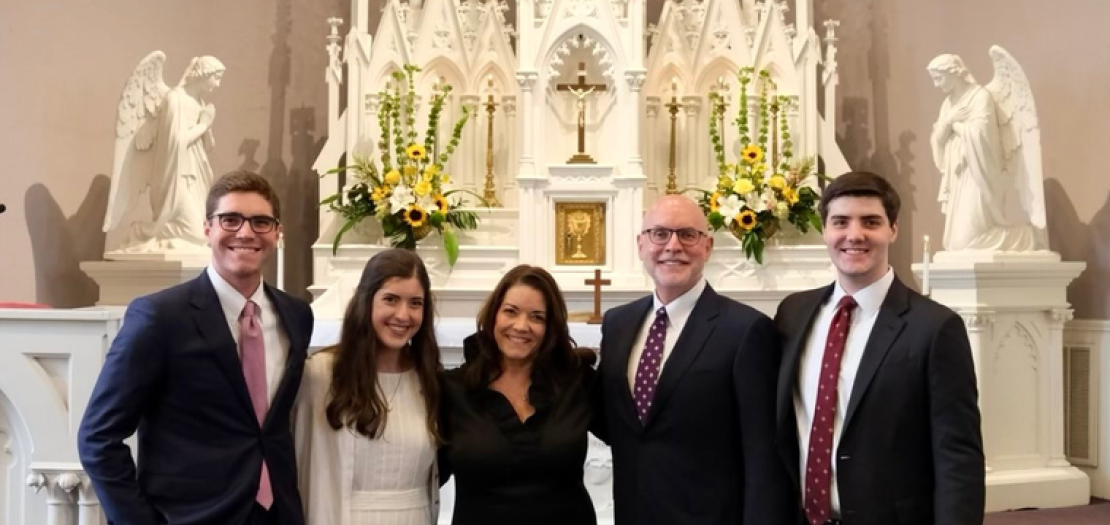
University of Notre Dame student Colin Smith didn’t expect the story of his family’s conversion to Catholicism, which he shared on X, to go viral.
“I am at a loss for words!” he wrote in one post. “It has been surreal to watch our story blow up and to be shared by so many Catholic heroes of mine.”
Raised a devout evangelical Protestant, Smith converted to Catholicism before beginning his freshman year at Notre Dame.
After his conversion, Smith wrote hundreds of letters to his parents and two younger siblings explaining the theological reasoning of his faith.
Four years later, his parents, Beth and Byron, and siblings, Abby and Andrew, entered the Catholic Church on Aug. 15, the Solemnity of the Assumption of Mary, at the St. Cecilia Motherhouse for the Dominican Sisters of St. Cecilia in Nashville, Tennessee.
Smith credited the “enemies of the Church” with convincing his family, explaining on the platform formerly known as Twitter how seeking the truth amid a secular, progressive culture drew his parents and siblings to the Church. “God trounced Satan at every turn,” he wrote online.
Smith spoke with the Register to share the inspiration behind the hundreds of letters he wrote to his family members throughout their gradual conversions. Responses have been edited for clarity and length.
What’s your conversion story?
In early high school, I began facing the questions that many Christians face around this age: Does God really exist? Is the Resurrection reasonable? Is the Bible reliable?
I decided to give every major religious view a fair examination, and I began experiencing an intense spiritual deadening. I only began to feel God again when the Dominican priests and sisters entered my life — especially Father Dominic Legge. He would visit our house for dinners, or we would visit him in D.C., and I remember being perpetually taken aback at how reasonable he made Christianity seem.
He introduced me to St. Thomas Aquinas and Thomism broadly — especially the Thomistic Institute, which he ran, and Pints with Aquinas, a now-famous podcast hosted by Matt Fradd. At the time, actually delving into Aquinas’ Summa Theologica would have been too much for me, but these less academic summaries helped introduce me to his thought.
Eventually, I began to read Aquinas' own writings, especially the Summa, and these sources convinced me of the Christian faith. I was especially struck by the number of excellent questions that Aquinas would pose, which I had never considered before. The study of basic Thomism was profoundly therapeutic. It totally changed how I viewed the world, and it erased much of the garbage modern philosophy that I had imbibed through the culture.
I decided that intellectual honesty demanded giving Catholicism a fair chance to persuade me. When I dove into the Catholic Tradition, I quickly realized that there were too many points of contention to cover, so I decided to focus on questions of authority.
St. John Henry Newman's “Essay on the Development of Christian Doctrine” finally convinced me of Catholicism's claims to authority by resolving my questions about why the Church Fathers disagreed about many theological issues. The other doctrines fell into place for me, and I became convinced of Catholicism in my senior year of high school. I became Catholic the following summer before Notre Dame at the Dominican House of Studies.
Online, you emphasized the role that “enemies of the Church” played in your family’s conversion, including this explanation, “Years before my own conversion, my family put my sister at a very secular progressive feminist girls’ school for middle school. That situation quickly became untenable. My sister was given demerits for drawing a Christmas tree on the white board one December, not because she wasn’t allowed to draw there, but because it could offend some students. Our parents decided that they had had enough. They decided to bite the bullet and send her to St. Cecilia Academy, the Catholic girls’ school down the road, run by the Dominican sisters! Through this school, the Eastern Province Dominican sisters and priests entered our lives!” Did they impact your conversion as well?
They did, but much less so than for my other family members. The primary way that enemies of the Church aided in my own conversion was to bring the Dominicans into my life and the lives of my family members. It was because of the antics of a secular, progressive girls’ school that my family became acquainted with the Nashville Dominicans and Father Dominic Legge became a mentor of mine.
How did your family view your conversion at the time?
It was quite difficult, but I never faced any serious disincentive from my parents to discourage my conversion. My sister had been attending St. Cecilia Academy, so she was familiar with the faith more than the rest of my family. Still, they attended my confirmation in D.C., which I remember thinking was a shocking show of love and support.
What inspired you to write letters to your family?
The most obvious reason that I wrote the letters was my love for my family and a genuine desire for them to find the fullness of the Christian life that I believed I had found.
However, I wrote letters specifically because I did not want to lecture them. Explaining the Catholic position in its disputes with Protestantism takes a long time, and giving extended lectures would be both awkward and undesirable. If I wanted to explain the faith in the appropriate detail, I knew that I had to write it down.
Furthermore, letters add a personal touch that I knew would be appreciated. I had developed the reputation of being very intellectual in my faith, as I am sure comes across even in my answers to these questions. Some members of the family viewed this as a fault, believing that it might have come at the expense of the heart. Letters were a great way to show love for my family and the emotional appeal of the faith while still providing the intellectual arguments.
What resources did you rely on in your apologetics? Were there any books or thinkers who you found to be helpful?
By the time that I was writing these letters, I knew most of the Catholic arguments on these [theological] disputes quite well myself. However, The Fathers Know Best stands out as an excellent book that I consulted throughout the process to find the quick references to the Church Fathers that I wanted to cite in my letters.
You mentioned online that Rome was an important place for your mother’s conversion. Were there any sites or experiences that especially impacted her?
The site that most impacted her was certainly the Circus of Nero. She and I had been discussing the Eucharist extensively at this point, but a tour of St. Peter's Basilica made all the difference.
She told me that her secular tour guide was explaining the key events in Nero's rule. When my mom turned to my brother to remark that Nero was a very evil man, this guide defended Nero, arguing that he never hated Christians. Rather, he thought they were “weird” for eating their God.
My mom was taken aback, and she asked for clarification. The tour guide confirmed that the reason for many early Christian martyrdoms was the martyrs’ refusal to recant the belief that the Eucharist is the true flesh and blood of Christ. Later, she told me that, because of this experience, she felt compelled to accept the Real Presence.
From your perspective, what was it like to view your family members growing in their faith and becoming increasingly curious about the Catholic faith?
It was truly remarkable. I think it is easy to mistakenly imagine the process as a gradual motion toward their becoming Catholic that I could observe. However, it was not always easy to discern movement in their relationship to Catholicism. At times, it felt like progress was being undone. I could not see what was happening before my eyes until near the end of the process. Once I realized what had happened, I was in awe of God’s providence.
How did it feel to welcome your parents and younger siblings into the Catholic Church last month?
It was a wonderful and beautiful experience. However, it was also a temptation to pride if I viewed it as my accomplishment, which it was decidedly not.
Part of the reason that I wrote the thread about their conversion for Twitter was to write out the ways in which God brought about their conversion where I was failing. The letters alone did not bring about their conversion. The biggest factors were totally outside of my control.
It was also a great honor and humbling duty to act as the sponsor for my father and brother. Beyond the indescribable experience of witnessing God shower my family with his graces in the sacraments, we also had many of our Catholic family friends in attendance for the private ceremony, which was a great joy.


